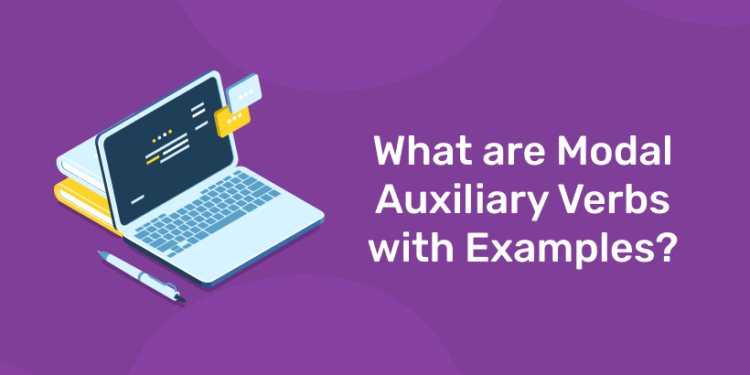Auxiliary verbs are verbs that help in forming voices of verbs, moods, and different tenses. The type of auxiliary verb called the modal auxiliary verbs are verbs that affect or determine the mood of the verb specifically. It is important to understand that the expression of an action or state is conveyed using verb moods as an opinion, a possibility, a wish, a command, or a statement of fact.
As facilitators of moods for the main verbs, Modal Auxiliary Verbs possess the characteristic of not changing their form, be it singular or plural nouns. Hence, it does not change for change in nouns. For singular nouns, plural nouns, she, he, I, we, and they, the modal auxiliary verb ‘shall’ remains the same. Primary auxiliary verbs include be, have and do.
Spoken English? Learn with Entri Learning App!
24 Modal Auxiliary Verbs
The most used types of the modal auxiliary verb in English are as follows:
- Will/Will not
- Would/Would not
- Can/Cannot
- Could/Could not
- Shall/Shall not
- Should/Should not
- Ought to
- May
- Might
- Must/Mustn’t
- Don’t/Doesn’t have to
- Have to/Has to
The use of modal auxiliary verbs in sentences can be shown in the following examples:
- Can/Cannot:
i) Stacy can play hockey. (Expressing ability)
ii) Raghav cannot multitask. (Negative form of modal verb ‘can’ expressing inability)
iii) Playing Kabbadi can be challenging. (Expressing possibility)
iv) (Negative form of modal verb ‘can’ expressing non-possibility)
v) Can you please get me a cup of coffee? (Request)
vi) You can’t visit the place today. (Refusal)
- Could/Couldn’t:
i) You could have messaged me. (As the past tense of ‘can’)
ii) Could you please pass the book? (Request)
iii) It could be dangerous. (Possibility of ‘now’ of an occurrence of an event)
- Will/Will not:
Expressing future possibilities/impossibilities or beliefs/disbeliefs.
i) He will pick you up soon. (Anytime in near future)
ii) She will message you tomorrow. (Near future)
iii) They will come to the office. (Unspecified time in future)
iv) He will not give you the book. (Negative form of modal verb ‘will’)
v) She won’t find the place. (Short form of will not is expressed as ‘won’t’)
vi) I will visit your office tomorrow. (As an offer or promise)
Learn English with Entri Learning App!
- Would/Wouldn’t:
i) Had she practiced, she would have scored well. (As past tense of ‘Will’)
ii) What would you do if you were elected? (Hypothetical situations)
iii) They would be delighted to meet you. (Result or outcome of a situation)
- Shall/Should:
i) Shall we go for tea? (Offer)
ii) We shall go for therapy. (Suggestion)
iii) Should I talk to her? (To ask a question)
iv) Shouldn’t they leave tonight? (Negative form of ‘should’)
v) The bus should arrive soon. (Prediction/Expectation)
- May/Might:
i) He may decline the offer. (Expressing future possibility)
ii) She may not accept the proposal. (Expressing future improbability)
iii) May I borrow your pen? (Polite request)
iv) He might win the game tonight. (Expressing possibility)
v) She might have lost the wallet there. (Past Tense)
- Must/have-has to/Ought:
i) He must attend the meeting. (Necessity)
ii) She must report this now. (Urgency)
iii) They have to abide by the rules.
iv) She has to go.
v) He ought to learn. (Obligation)
vi) They ought to have left the club. (Past tense)
The modal auxiliary verbs are never used as the main verb in a sentence. Also, they do not have the five forms of the main verb. These modal auxiliary verbs do not have the five forms that other auxiliary verbs (such as “be” and “have”) have.
Read more on ‘The Secret Power of the Four English Language Skills: Tips to Improve Your Speaking, Writing, Listening, and Reading‘ here.
Make English your strong point with Entri Learning App!
If you want to improve your speaking, writing, listening, and reading skills, proper guidance, and assessment will help you begin your journey to learning English. The Spoken English course offered by Entri App, “English Padikkyam with Inverted Coconut” by Aparna Mulberry, is the best way to learn English. The course structure, classes, tests, and live sessions are designed to help you improve your understanding and communication in English with clarity and confidence. The course is tailored to meet the needs of each student, by providing varying learning speeds and providing methods that are most comfortable and convenient for them. With the Entri Learning App, make English your strong point. In comparison to other languages, English has simpler grammar, easier verb usage, and simpler plurals. Therefore, it is easy to learn a new language but it is important to keep learning to ensure that you keep up with the language.









